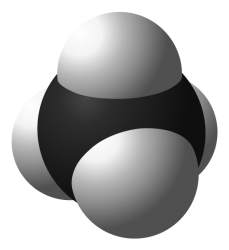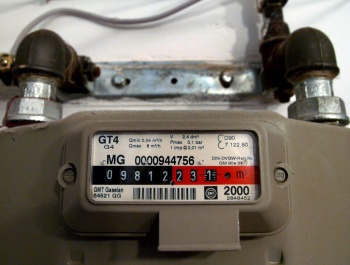Difference between revisions of "Methane"
(basic page) |
(added gas meter image) |
||
| Line 1: | Line 1: | ||
| − | [[File:550px-Methane-3D-space-filling.svg.png|thumb| | + | [[File:550px-Methane-3D-space-filling.svg.png|thumb|x250px|right|methane CH<sub>4</sub> (main compound of natural gas)]] |
| + | [[File:Gaszähler--AP07110403664-1024x775.jpg|350px|thumb|righ|Gas metering device as found in todays (2021) technology.]] | ||
'''Methane aka "natural gas".''' <br> | '''Methane aka "natural gas".''' <br> | ||
Revision as of 12:04, 30 June 2021
Methane aka "natural gas".
Today available from fossile fuel and as bio-gas from composting bio-waste.
Methane is a possible resource molecule for future gemstone metamaterial on-chip factories.
In contrast to ethyne (aka acetylene) as a resource molecule:
- is carries four times as much hydrogen atoms per carbon atom. It's 4:1 (methane) instead of 1:1 (ethyne)
- it is chemically much less reactive. This should not be much of an issue for splitting it up piezochemically though.
Contents
About reusing existing infrastructure for a while
Using the old gas pipeline network
There is already a pipeline infrastructure in place supplying this gas to us.
If in the course of our transition to renewable energy sources
this infrastructure is not
- neglected beyond usability
- actively removed
- turned into a pure hydrogen supply network (if hydrogen embrittlement is not too much of an issue)
Then this existing network of pipelines may serve as a good source for carbon during the technological transition phase
till a global microcomponent redistribution system is set up.
In place upgrading the old gas pipeline network:
Installing the "lines" of a future global microcomponent redistribution network in part through existing gas lines
might be an idea worthwile to investigate.
Using the "old" electric grid
Alternatively carbon dioxide from the air can be taken as a carbon resource. Requiring supply of significant amounts of energy.
During the technological transition phase that may put a big load on the existing electric grid.
Later that can be done maybe with chemical energy transmission (See: Energy transmission).
Gas cylinders
These are much more cumbersome than gas pipes or air and electric cables.
When using etyne as the carbon resource then gas cylinders are the only option.
Similar for some other elements (phosphorus, sulfur, ...) but most are less needed.
Resources for the extremely abundant but usually "rock-locked" silicon are a special topic.
Upgrading gas transport
- from today's gas cylinders to
- future gemstone metamaterial based resource molecule transport capsules
amounts to just a simple switch-out.
These capsules would:
- contain the comtent in a very safe micropackaged way
- use incomustible materials (e.g. using incombustible moissanite or sthishovite) for hull and micropackaging
- not need to be shaped cylindrically due to the micropackaging taking care of the prressure already – think battery powerbank form factor
(Meta: It's 2021 I already can use "battery powerbanks" as a reference).

